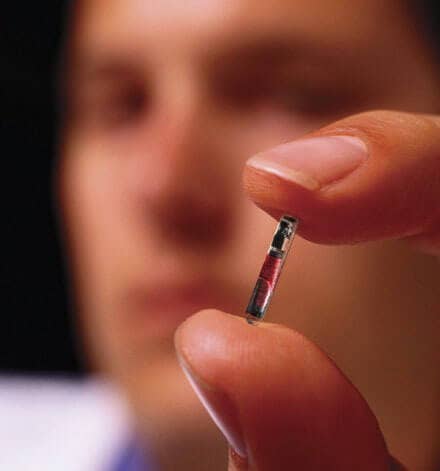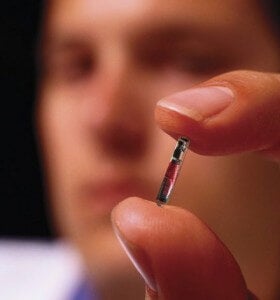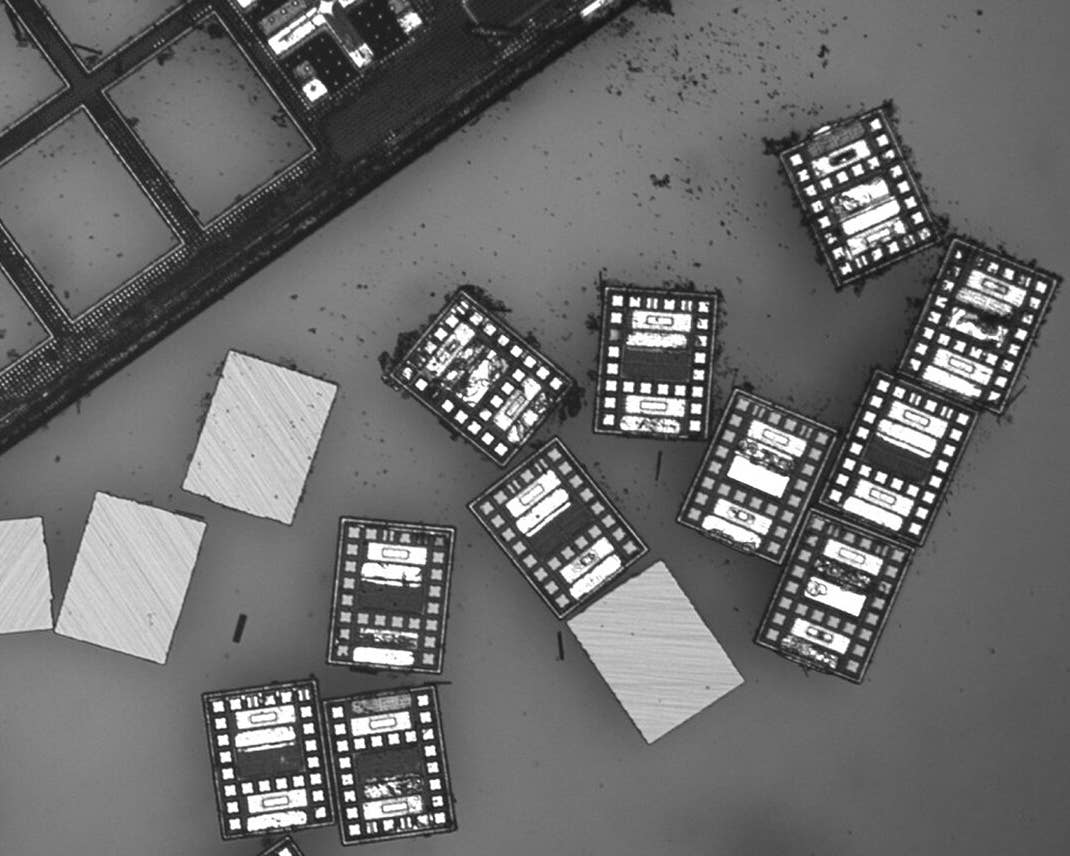Will Your ID Soon Be a Microchip Under Your Skin?

Share
Yet another sci-fi milestone is upon us: microchips implanted under your skin and used to identify you.

The VeriChip is the first radio-frequency identification (RFID) microchip that's been approved by the Food and Drug Administration for use in humans. The chip is the size of a long grain of rice, and can be implanted pretty much anywhere in the body (most commonly along the tricep). Depending on how it's used, the chip could do anything from telling doctors your medical background to buying you a round at the club.
Outside of human bodies, RFID is already used for a wide range of purposes. If you pay highway tolls electronically, that little box in your car has an RFID tag in it. Lots of folks implant their pets with RFID chips in case they get lost, as animal shelters increasingly scan pets for them. Wal-Mart tracks their shipments with RFID, which has apparently revolutionized supply chain management. Hell, there's even one in your passport.
But why put one inside your body? As interesting as it might be to have your ID show up on an x-ray, most people would rather suffer a line at the DMV than a rice-injection. Sure, it might make for good conversation at a party. But is that worth the needle? What would it take to get one under your skin?
Emergency Situations
VeriChip Corp. markets their product to address what they call "a serious need for personal identification and information in emergency situations." Over the past two years, the company has piloted their product with 200 Alzheimer's patients in a Florida facility. Because of their condition, many patients are unable to effectively communicate if they are admitted to the hospital without caregivers present. The VeriChip contains a 16-digit ID number which links the recipient to a secure computer database where their medical information is stored. The chips are used to replace MedicAlert wristbands, which can be removed or damaged.
Most other proposed applications for in-body RFID are medical in nature: providing doctors immediately with a patient's medical records, or identification if they are unconscious or unable to communicate. Still, these applications require that each hospital contain a computer database to connect an individual's tag with their information. That's probably a long way off.

Luckily, the hospital isn't the only testing ground for RFID chips under the skin. A nightclub in Barcelona called Baja Beach has started offering chip implants to its customers, giving them access to VIP lounges and letting clubbers buy drinks by acting as a debit account. Who wants to carry a wallet or purse when the dress-code is board shorts and bikinis? Baja Beach contracted none other than VeriChip Corp. to fashion their subcutaneous membership cards. I guess last call counts as an "emergency situation."
In the past, VeriChip Corp claimed their chips could not be counterfeited: if your ID is under the skin, it can't be so easily stolen. Wrong. At a hacker conference in 2006, Annalee Newitz and Jonathan Westhues showed that they had successfully cloned an RFID chip implanted in Newitz. A home-built antenna let the hackers steal the unique ID contained on the chip, which apparently lacks any sort of security device.
Be Part of the Future
Sign up to receive top stories about groundbreaking technologies and visionary thinkers from SingularityHub.


If RFID chips aren't exactly secure, most people won't want their social security number contained on one. After all, if a doctor's office can pull your medical records from the chip (and a hacker can, too) what's stopping your insurance agency? Or identity theives? That limits the chips to using random numbers, corresponding to useful information on a separate and secure database. And until those databases are standardized and prevalent, having a chip in your body won't speed up your doctor's visit very much.
Counter-ID
As you might already imagine, in-body RFID chips have spawned a considerable backlash of protest. The group AntiChips calls the VeriChip "human branding," especially in the case of the "volunteers" for the program with Alzheimer's disease. They also claim the chips cause cancer (citing a number of animal studies), and that the FDA approval should be revoked (more info here). There are also a number of additional risks which the FDA already recognizes: tissue reactions, migration of the chip, even the chance that the chip could carry a current from MRI magnets and burn the patient.

And that's just the beginning. The chips have been called the precursor to a perfect authoritarian state, letting Uncle Sam (or Illuminati, or whoever) track your each and every move. On the other end of the spectrum, some religious groups (well, okay, this one) have implicated the VeriChip in a plot involving the mark of the beast (666), part of a conspiracy theory to rival the most imaginative of left-wingers. Wait, this one too.
But if I can interject my own opinion, I'd say the whole business is a bit overhyped. Honestly, there aren't really any good applications for in-body RFID. Sure, it could hypothetically improve health-care (if and when the patient is unconscious), but for that system to be effective, every hospital would need to have integrated the chips into their standard procedures. It won't replace a photo ID in your wallet anytime soon. And unless you're grinding some PYT* in Barcelona, you'll probably pay for that Pabst with good old fashioned cash. Take (a) the lack of practical applications, plus (b) legitimate concerns over ID hacking and health risks, and poof! There goes the revolution.
If any readers have ideas for scenarios in which an in-body RFID would be practical & useful, please do share (comments below).
*RIP M.J.
Drew Halley is a graduate student researcher in Anthropology and is part of the Social Science Matrix at UC Berkeley. He is a PhD candidate in biological anthropology at UC Berkeley studying the evolution of primate brain development. His undergraduate research looked at the genetics of neurotransmission, human sexuality, and flotation tank sensory deprivation at Penn State University. He also enjoys brewing beer, photography, public science education, and dungeness crab. Drew was recommended for the Science Envoy program by UC Berkeley anthropologist/neuroscientist Terrence Deacon.
Related Articles

These Robots Are the Size of Single Cells and Cost Just a Penny Apiece

How Scientists Are Growing Computers From Human Brain Cells—and Why They Want to Keep Doing It

These Brain Implants Are Smaller Than Cells and Can Be Injected Into Veins
What we’re reading